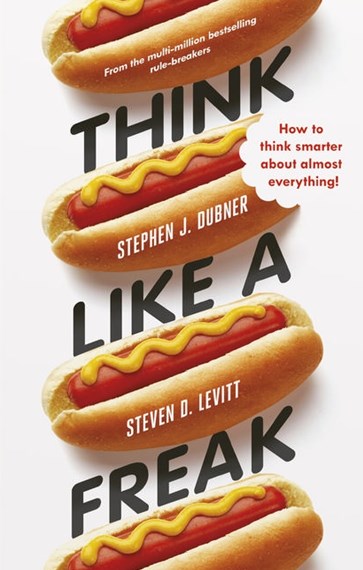
Think Like a Freak by Steven D. Levitt & Stephen J. Dubner
The Authors of Freakonomics Offer to Retrain Your Brain
After the audiobook ends it gives you pieces of the authors’ other works and podcasts. They have weird ideas like carrying a jar of vomit round your neck and take a whiff every time you get hungry as the fastest way to lose weight… and being a conversation piece.
Notes:
– Lots of awkward and embarrassing stories of experts.
– The next generation should not continue the family business. Studies show it’s better to get in a fresh manager.
– Married people are happier… more like happier people are likelier to get married. Who wants to be with a sour puss.
– Stock market predictors <50% accurate. As good as chimp throwing darts.
– TV ads thought to be better than print. Randomised control trial was proposed. Print ads when not run didn’t reduce sales and the TV ads were run on days that people were already going to buy like Xmas.
– Even experts can’t tell difference between cheap and expensive wines. Dude makes fake restaurant to show that it’s all just another scheme. (Paras note: like well built stars get paid to say they use so and so supplements.)
– Teacher quality has dropped because smart women have better job options. But teacher skill doesn’t matter. American kids know less than other countries and it’s because of parents not the school system.
– How to win at hot-dog eating competitions. It’s artificial limits. Eg if you think 10 push-ups you get tired at 7. If you think 20 puch-ups you’ll tire at 17. The guy who ate double the record cut hotdogs with hands to reduce time biting. It’s easier to chew/swallow the sausage and sop the bun in warm water. Things like that.
– Black Americans die earlier than whites because of hypertension and heart disease. So slave traders used to lick the slaves to see how salty they were to gauge their health. Meanwhile the health of Africans elsewhere were no different to white Americans.
– Faeces from healthy person helps sick persons guts and other ailments. They call it faecal transplants or faecal therapy! Jokes about transpoosion, shit swap.
– Having fun is important to be successful. Love what you do.
– Kids are harder to fool by magicians especially because of their freakish height (basically because they’re short they see things from a different angle.
– A high nutrition diet can cost up to 10 times more than a junk food diet.
– Cash incentives work great but a cheaper way is finding out their herd mentality incentive. Experiment ran on moral, social, financial and herd mentality values. Look up Robert Cialdini experiment.
– Declared and revealed preferences. What people say and what they do is different.
– The trail with the don’t steal sign had more theft.
– People give money because of altruistic reasons or feel-good factor which is also called warm glow altruism or social pressure. But one guy tried a once and done method with 3 options. 1 – once and done, 2 – send letters twice a year, 3 – regular updates. People hardly checked ‘once and done’. People were twice as likely to donate compared to normal and also gave more money.
– Paying incentives to stop something usually makes it worse. E.g.s – HCFC gasses, cobras India, feral pigs in US and rats in South Africa.
– 6 incentive rules. 1 – What people really care about, 2 – Cheap for you, 3 – How they respond, 4 – Cooperative frame, 5 – Just coz it’s the right thing they won’t do it, 6 – Some people will take advantage.
– The whole van halen brown m&m game theory. No brown ones meant the hosts read the contract and did the line check.
– Story of secret bullet factory in Israel and their warm beer alarm so the British soldiers would call in advance to make sure the Israelis chilled the beers.
– Scam emails from Nigeria called Advanced fee fraud.
– Terrorist algorithms in banks. The main factor was looking for clients who did not get life insurance. Best part was they let out the secret so now they just had to sit and wait to see who got life insurance.
– The best way to persuade people, especially those not interested, is to tell stories.
– 3 forces that help against quitting.
1 – being a failure.
2 – sunk cost fallacy/concord fallacy/throwing good money/time/effort after bad.
3 – ignoring opportunity cost over concrete cost. What opportunity will you miss if you didn’t quit?
– Freakonomics radio podcast snippets included.
– Stats on tipping. Older, fatter, people and smokers tip more. More attractive women got more tips not so for men. Blonds, slender, bigger, breasts in 30s got better tips. If staff touch shoulder they get more more tip. Smiley face or squat down increases tips. Service quality for tips is weak. Blacks got tips less or none. Both blacks and whites will tip blacks less.
– Women won’t pick work or activities that are confrontational or competitive unless they grew up in cultures where women had equal or more power and equality.
Table of Contents
1. What Does It Mean to Think Like a Freak?
– An endless supply of fascinating questions . . .
– The pros and cons of breast-feeding, fracking, and virtual currencies . . .
– There is no magic Freakonomics tool . . .
– Easy problems evaporate; it is the hard ones that linger . . .
– How to win the World Cup . . .
– Private benefits vs. the greater good . . .
– Thinking with a different set of muscles . . .
– Are married people happy or do happy people marry? . . .
– Get famous by thinking just once or twice a week . . .
– Our disastrous meeting with the future prime minister.
2. The Three Hardest Words in the English Language
Why is “I don’t know” so hard to say? . . .
– Sure, kids make up answers but why do we? . . .
– Who believes in the devil? . . .
– And who believes 9/11 was an inside job? . . .
– “Entrepreneurs of error” . . .
– Why measuring cause-and-effect is so hard . . .
– The folly of prediction . . .
– Are your predictions better than a dart-throwing chimp? . . .
– The Internet’s economic impact will be “no greater than the fax machine’s” . . .
– “
Ultracrepidarianism” . . .
– The cost of pretending to know more than you do . . .
– How should bad predictions be punished? . . .
– The Romanian witch hunt . . .
– The first step in solving problems: put away your moral compass . . .
– Why suicide rises with quality of life— and how little we know about suicide . . .
– Feedback is the key to all learning . . .
– How bad were the first loaves of bread? . . .
– Don’t leave experimentation to the scientists . . .
– Does more expensive wine taste better?
3. What’s Your Problem?
– If you ask the wrong question, you’ll surely get the wrong answer . . .
– What does “school reform” really mean? . . .
– Why do American kids know less than kids from Estonia? . . .
– Maybe it’s the parents’ fault! . . .
– The amazing true story of Takeru Kobayashi, hot-dog-eating champion . . .
– Fifty hot dogs in twelve minutes! . . .
– So how did he do it? . . .
– And why was he so much better than everyone else? . . .
– “To eat quickly is not very good manners” . . .
– “The Solomon Method” . . .
– Endless experimentation in pursuit of excellence . . .
– Arrested! . . .
– How to redefine the problem you are trying to solve . . .
– The brain is the critical organ . . .
– How to ignore artificial barriers . . .
– Can you do 20 push-ups?
4. Like a Bad Dye Job, the Truth Is in the Roots
– Why a bucket of cash will not cure poverty and a planeload of food will not cure famine . . .
– How to find the root cause of a problem . . .
– Revisiting the abortion-crime link . . .
– What does Martin Luther have to do with the German economy? . . .
– How the “Scramble for Africa” created lasting strife . . .
– Why did slave traders lick the skin of the slaves they bought? . . .
– Medicine vs. folklore . . .
– Consider the ulcer . . .
– The first blockbuster drugs . . .
– Why did the young doctor swallow a batch of dangerous bacteria? . . .
– Talk about gastric upset! . . .
– The universe that lives in our gut . . .
– The power of poop.
5. Think Like a Child
– How to have good ideas . . .
– The power of thinking small . . .
– Smarter kids at $15 a pop . . .
– Don’t be afraid of the obvious . . .
– 1.6 million of anything is a lot . . .
– Don’t be seduced by complexity . . .
– What to look for in a junkyard . . .
– The human body is just a machine . . .
– Freaks just want to have fun . . .
– It is hard to get good at something you don’t like . . .
– Is a “no-lose lottery” the answer to our low savings rate? . . .
– Gambling meets charity . . .
– Why kids figure out magic tricks better than adults . . .
– “You’d think scientists would be hard to dupe” . . .
– How to smuggle childlike instincts across the adult border.
6. Like Giving Candy to a Baby
– It’s the incentives, stupid! . . .
– A girl, a bag of candy, and a toilet . . .
– What financial incentives can and can’t do . . .
– The giant milk necklace . . .
– Cash for grades . . .
– With financial incentives, size matters . . .
– How to determine someone’s true incentives . . .
– Riding the herd mentality . . .
– Why are moral incentives so weak? . . .
– Let’s steal some petrified wood! . . .
– One of the most radical ideas in the history of philanthropy . . .
– “The most dysfunctional $300 billion industry in the world” . . .
– A one-night stand for charitable donors . . .
– How to change the frame of a relationship . . .
– Ping-Pong diplomacy and selling shoes . . .
– “You guys are just the best!” . . .
– The customer is a human wallet . . .
– When incentives backfire . . .
– The “cobra effect” . . .
– Why treating people with decency is a good idea.
7. What Do King Solomon and David Lee Roth Have in Common?
– A pair of nice, Jewish, game-theory-loving boys . . .
– “Fetch me a sword!” . . .
– What the brown M&M’s were really about . . .
– Teach your garden to weed itself . . .
– Did medieval “ordeals” of boiling water really work? . . .
– You too can play God once in a while . . .
– Why are college applications so much longer than job applications? . . .
– Zappos and “The Offer” . . .
– The secret bullet factory’s warm-beer alarm . . .
– Why do Nigerian scammers say they are from Nigeria? . . .
– The cost of false alarms and other false positives . . .
– Will all the gullible people please come forward? . . .
– How to trick a terrorist into letting you know he’s a terrorist.
8. How to Persuade People Who Don’t Want to Be Persuaded
– First, understand how hard this will be . . .
– Why are better-educated people more extremist? . . .
– Logic and fact are no match for ideology . . .
– The consumer has the only vote that counts . . .
– Don’t pretend your argument is perfect . . .
– How many lives would a driverless car save? . . .
– Keep the insults to yourself . . .
– Why you should tell stories . . .
– Is eating fat really so bad? . . .
– The Encyclopedia of Ethical Failure . . .
– What is the Bible “about”? . . .
– The Ten Commandments versus The Brady Bunch.
9. The Upside of Quitting
– Winston Churchill was right—and wrong . . .
– The sunk cost fallacy and opportunity cost . . .
– You can’t solve tomorrow’s problem if you won’t abandon today’s dud . . .
– Celebrating failure with a party and cake . . .
– Why the flagship Chinese store did not open on time . . .
– Were the Challenger’s O-rings bound to fail? . . .
– Learn how you might fail without going to the trouble of failing . . .
– The $1 million question: “when to struggle and when to quit” . . .
– Would you let a coin toss decide your future? . . .
– “Should I quit the Mormon faith?” . . .
– Growing a beard will not make you happy . . .
– But ditching your girlfriend might . . .
– Why Dubner and Levitt are so fond of quitting . . .
– This whole book was about “letting go” . . .
– And now it’s your turn.
Acknowledgements
Notes
Index
Amazon #ads





